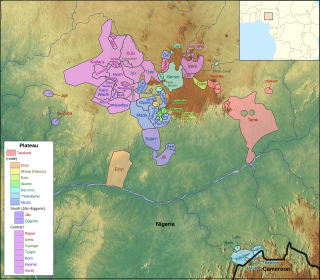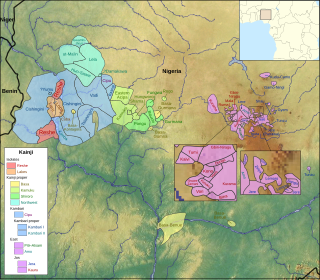Related Research Articles

The forty or so Plateau languages are a tentative group of Benue–Congo languages spoken by 15 million people on the Jos Plateau Southern Kaduna, Nassarawa State and in adjacent areas in central Nigeria.
Pongu (Pangu), or Rin, is a Kainji language spoken in Nigeria. There are about 20,000 speakers. Their main centre is in Pangu Gari town of Niger State, about 20 kilometres southeast of Tegina. In Niger state, Rafi local government Kagara

The Kainji languages are a group of about 60 related languages spoken in west-central Nigeria. They form part of the Central Nigerian (Platoid) branch of Benue–Congo.
The East Kainji languages are spoken in a compact area of the Jos Plateau in Nigeria, near Jos. There are more than 20 of them, most of which are poorly studied.

Zele is an East Kainji language of Bassa LGA in northern Plateau State, Nigeria.
Sanga is an East Kainji language of Nigeria belonging to the Shammo cluster.
The Kamuku languages are a branch of the Kainji languages spoken by the Kamuku people of Niger State, western Nigeria, mostly in Mariga and Rafi LGAs.
Bauchi is a cluster of Kainji languages spoken in Rafi, Nigeria LGA, Niger State, Nigeria.
Hungworo, or Ngwe, is a Kainji language spoken in the Tegina area of Rafi, Nigeria.
Kimba is a Kainji language cluster of Nigeria spoken by the Kambari people. As of 2004, there were 100,000 native speakers.
Gurmana is a Kainji language of Gurmana village in Shiroro LGA, Niger State, Nigeria. There are no more than 2,000 to 3,000 speakers in Gurmana village and nearby hamlets.
Lere is a nearly extinct Kainji dialect cluster of Nigeria. The ethnic population was cited as 16,000 in 2000, of whom only a few speak the language. A wordlist from the Takaya dialect can be found under External links.
Tunzu (Tunzuii), or Itunzu, also known as Duguza (Dugusa) in Hausa, is a Kainji language of Nigeria.
The six Northwest Kainji languages, formerly known as Lela, are spoken near Kainji Lake on the Niger River in Nigeria. They are distinguishable from other Kainji languages by the reduction of their noun-class prefixes to single consonants.
Boze, also rendered Buji, is an East Kainji language of Nigeria belonging to the Shammo cluster. Boze is spoken in a contiguous area Bicizà, directly to the north of Jos city in Plateau State, Nigeria.
Gusu is an East Kainji language of Nigeria belonging to the Shammo cluster. It is spoken in Toro LGA, Bauchi State and in Bassa LGA, Plateau State.
Loro is an East Kainji language of Toro LGA, Bauchi State, Nigeria belonging to the Shammo cluster.
The Shammo (Shammɔ) or Jere languages are spoken in north-central Nigeria. They form a subgroup within the East Kainji languages.
Moro is an East Kainji language of Nigeria belonging to the Shammo cluster.
Bunu or Ribina is an East Kainji language of Toro LGA, Bauchi State, Nigeria belonging to the Shammo cluster.
References
- 1 2 3 4 5 Blench, Roger. 2021. Introduction to the Shammɔ peoples of Central Nigeria .
- ↑ Blench, Roger M. 2018. Nominal affixing in the Kainji languages of northwestern and central Nigeria. In John R. Watters (ed.), East Benue-Congo: Nouns, pronouns, and verbs, 59–106. Berlin: Language Science Press. doi : 10.5281/zenodo.1314323